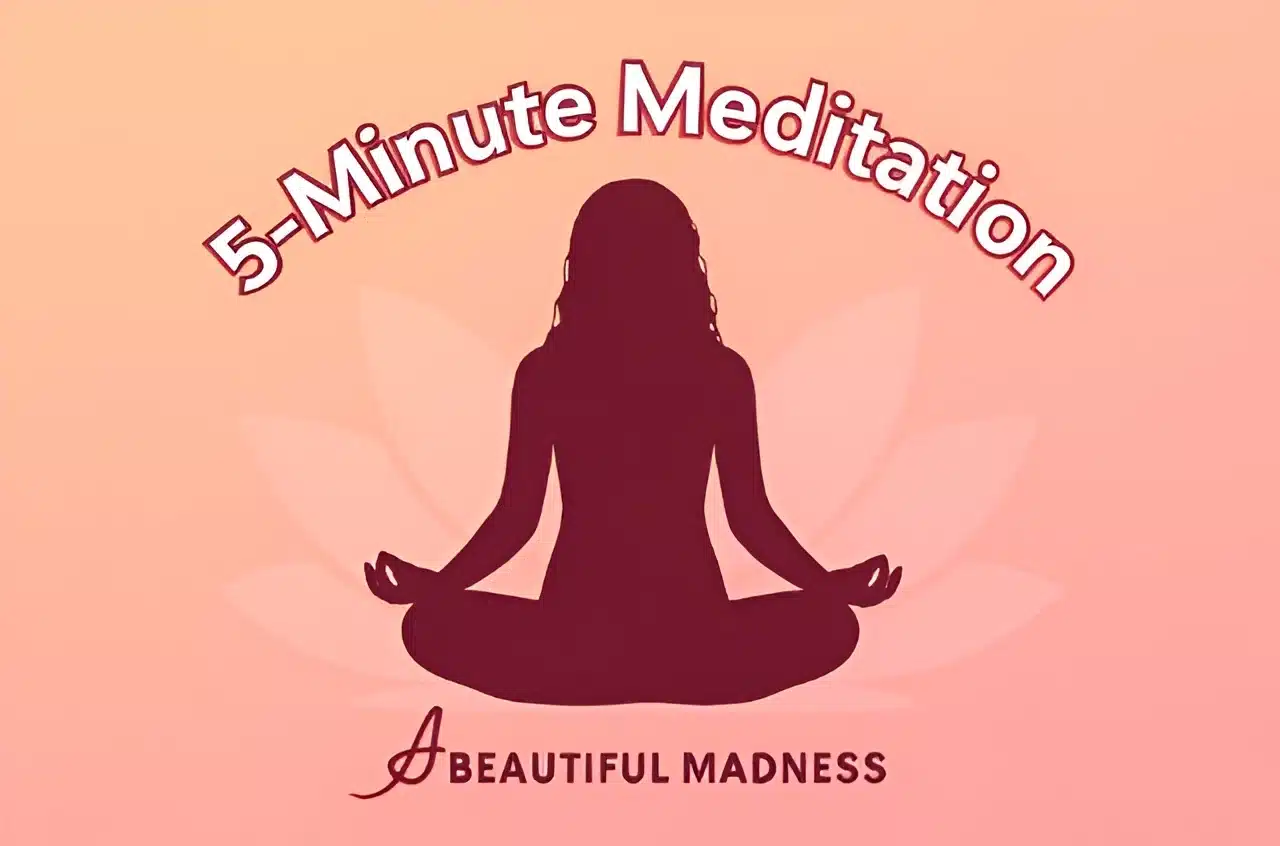We have all experienced those restless nights, bothered by visions of past choices or future uncertainties. Meditation offers a remedy, stilling the mind and enabling us to live in peace while bringing us to intentional acts in alignment with our capacity.
Overthinking can put someone in a mental lock that never allows one to break free from the circuit of reflection, leaving them immobile and unable to progress or make decisions. Unless kept under control, it can convert into mental illnesses such as anxiety, depression, and OCD.
Now is the time to let go of overthinking to build self-confidence and trust our intuitive wisdom. Even in its subtlest form, overthinking is wasteful. It takes us away from the natural wisdom in our bodies and hearts. Releasing overthinking builds self-trust and faith in our intuitive wisdom to lead the way.
Meditation is an excellent means of enhancing mental well-being, and studies have proven that it is as good as medication in healing chronic anxiety symptoms. Meditation helps you draw nearer to a tranquil existence. The use of meditation in terms of mental health is increasingly recognized, including in the National Health Interview Survey, where the percentage of US adults who have ever practiced meditation more than doubled between 2002 and 2022.
What actually is overthinking?

Our minds are ceaselessly active, inundated with thoughts ranging from worries and joys to work and stress. The mere mention of these mental burdens can induce stress. While it’s natural for our minds to race, it poses challenges for overthinkers. But what does it truly mean to be an “overthinker”? Picture this: a rough day at work consumes your thoughts even after you return home. You think life is so hard. You replay scenarios, pondering what others may think of you for various mishaps. Overthinking fixates on situations, dwelling on past events, and imagining different outcomes. It manifests as excessive worry about the future, draining energy and detracting from the present moment’s tranquility. Ultimately, overthinking proves draining and prevents full engagement with the present.
What is guided meditation for anxiety and overthinking?
This technique uses mindfulness to foster present-moment awareness and prevent excessive mental wandering. During sessions, you may be instructed to lie down on your back for relaxation. The instructor emphasizes the importance of maintaining a clear mind, guiding you toward peace, and encouraging you to carry it throughout the day. Daily practice is advised until you can independently manage your thoughts.
Read Also: How can Mindfulness Save your Relationship
How does meditation aid overthinkers?
Meditation helps bridge overthinking from complexity to simplicity and being present. It enables breaking the cycle of rumination that offers the cultivation of mindfulness of thoughts, emotions, and the body.
Meditation benefits both mental and physical health, alleviating issues like social anxiety disorder, PTSD, anxiety, depression, diabetes, hypertension, and fibromyalgia.
Mindfulness of Thoughts:
In meditation, we become aware when we start overthinking and leave space to challenge our point. A research study shows that observation of the thinking process effectively stops rumination, and this approach reduces anxiety and panic induction by challenging distorted thoughts.
Mindfulness of Emotions:
Major instances of overthinking result from the inability to face distress, wherein a person remains in emotional repression. Meditation develops emotional control, so people do not think excessively, as they can feel emotions.
Mindfulness of the Body:
To know what is happening inside us, our interoception prevents overthinking. Through mindfulness, tuning into our physical signals with awareness of breathing, we will finally find freedom from the grip of ruminations, clarity in the simple act of just being, and other benefits such as stress reduction, better sleep, and more help in weight reduction.
Wisdom:
Overthinking entangles us in narratives of the past and future, disconnecting us from the present reality. Meditation anchors us in the truth of the moment, transcending our narratives. With practice, we detach from thoughts, embracing emotions, change, and uncertainty. Overthinking wanes as we release the illusion of control.
Starting Meditation for Overthinkers
Establishing practical outlooks and objectives:
Practicing meditation with a mind clouded by overthinking, anxiety, and panic attacks calls for setting applied perspectives and goals, just like you would set up a mindful wardrobe by looking at the latest fashion trends. It is essential to remind oneself of patience and self-compassion on the way to meditation because improvements in meditation naturally tend to be slow.
Selecting an appropriate meditation approach:
For those prone to overthinking, delving into diverse meditation techniques tailored to individual needs is key. Mindfulness meditation, centered on non-judgmental awareness of the present moment, proves especially advantageous. Mindfulness meditation encourages present-moment awareness and keeps you calm and focused when faced with tense situations. Additionally, guided meditation, wherein a pre-recorded voice or application offers guidance and encouragement, can serve as a valuable resource. Experimenting with various techniques is essential to pinpoint what resonates best with you.
Tools and Apps Suggestions
Some helpful options include:
Apps:
- Headspace: A very popular meditation app that provides you with guided sessions and personalized tracking.
- Calm: A very popular sleep and meditation app that provides you with guided meditations, sleep stories, relaxing music, bedtime, and relaxation to help you feel better.
- Insight Timer: A free app providing you with a decent collection of guided meditations and also a timer for tracking your own practice.
- The Mindfulness App: Achieve peace, clarity, and wisdom with our mindfulness app. Guided meditation, relaxation techniques, and mindfulness exercises enable you to develop more awareness and peace.
Tools:
1. Meditation pillows or cushions: Give your back and legs support and comfort during meditation.
Price: $42.99
2. Meditation benches: Give your legs and back support during meditation.
Price: $39.99
3. Essential oils or aromatherapy: These can create a peaceful and calming atmosphere.
Price: $9.99
4. Meditation journals: Enable you to write down thoughts, impressions, and feelings after meditation.
Price: $20.62
Developing a regular meditation routine
Consistency is crucial for experiencing the full advantages of meditation, and you don’t need to dedicate extensive daily periods to it. Just 10 minutes of meditation suffices.
Engage in group meditation: Despite its solitary nature, meditating in a group offers various advantages, especially if you’re prone to overthinking. It aids in:
- Breaking free from repetitive thoughts
- Establishing accountability
- Fostering a sense of belonging
- Boosting focus and vitality.
Begin by paying attention to your breathing:
When feeling tense or anxious, taking slow, deep breaths is often recommended as it soothes the nerves and reduces anxiety. Moreover, it serves as a center of attention during meditation to redirect troubling thoughts.
Incorporate music into your meditation practice.
Music can enhance the meditative experience and promote relaxation. Level Supermind offers a wide selection of purpose-driven music, such as for enhancing focus, creativity, self-awareness, and relieving stress and anxiety. Additionally, there are specific melodies (such as water sounds) and musical styles suitable for studying, working, or sleeping.
Experiencing wandering thoughts?
If your mind tends to wander during meditation, it’s normal. However, criticizing yourself won’t aid in achieving a meditative state. Instead, when a thought arises, simply acknowledge it and gently guide your focus back to your breath or chosen focal point.
Starting your meditation journey may prompt the question, “What should I focus on?” There are various focal points available to help maintain concentration and attain a state of tranquility.
Doodle Art for Mindfulness
Creating doodle art is a simple yet effective way to alleviate stress and manage emotions. Repeatedly drawing lines to create a doodle can reduce feelings of being overwhelmed and help you feel more balanced.
When we focus solely on doodling, we can develop a beautiful mindfulness practice. While often done alongside other activities like learning in class or talking on the phone, doodling allows kids and adults to slow down and be present. This can be encouraged by having them focus on the movement of their drawing tool, the sound it makes on the paper, the texture of the paper, the placement of their lines, their breathing, etc. Essentially, focusing on the moment. Remind them that in doodle art, the final product is less important than their state of being while creating it. The magic is in the doodling process!
Many studies have looked at the effects of cool doodle ideas on mental health. Drawing doodles or zentangles can help reduce psychological distress and anxiety by promoting relaxation. The repetitive and carefree motions of doodling have been shown to suppress the body’s fight-or-flight response. In fact, creating art in general is a proven method for lowering cortisol levels, also known as the stress hormone.
Mistakes to Avoid While Meditating
At first, one needs to avoid some mistakes that can be a hindrance to your meditating process. The following are some of those mistakes that are to be avoided:
1. Having an empty mind: Never try with an empty mind. Instead, try to observe and let go of distractions.
2. Too self-critical: Be gentle and compassionate to yourself. Mistakes are fine in learning by meditation.
3. Sitting for too long: Meditate for a short duration and increase the sitting time gradually. It leads to habit and not frustration.
4. No quiet room: Choose a quiet, peaceful room with no distractions and interruptions to meditate.
5. As a coping mechanism via meditation: Meditation is never to cope with difficulties but to confront them with clarity and composure. Use it as a meditation of self-evolution and self-improvement.
6. Comparing yourself with others: Find your process and transform. Each person’s meditation process will vary, and comparison will fail.
7. Quitting too soon: Don’t quit. Try to meditate every day, even for a few minutes, and don’t be critical of your own learning curve.
By avoiding these quickfalls, you’ll be ready to welcome a richly rewarding and life-changing meditation practice.
Final Words:
No matter which meditation technique you experiment with, bear in mind that regularity holds the utmost importance, even if it entails just 5-10 minute sessions. Similar to our daily routines of showering or brushing our teeth, meditation serves as a means to alleviate daily stressors, promoting a sense of tranquility and inner strength. Best wishes on your meditation voyage!
FAQs
Q: What is overthinking, and how does it affect mental health?
A: Overthinking is an excessive focus on thoughts, fears, and emotions, which causes mental health difficulties such as anxiety, depression, and OCD. It makes us unavailable and out of our intuitive knowing.
Q: How does meditation end overthinking?
A: Meditation enables us to see out and combat habitual overthinking thought processes. Meditation aids in emotional regulation, interoceptive focus, and freedom of mind, avoiding overthinking.
Q: What type of meditation is best for overthinkers?
A: Guided and mindfulness meditation work best for overthinkers. You just have to experiment and select the optimum technique that may work for you.
Q: How do I begin an overthinking meditation practice?
A: Start with short practice sessions (10 minutes), concentrate on breathing, and build rational perceptions and goals. Regularity is critical, and music or group meditation can help make your practice better.



